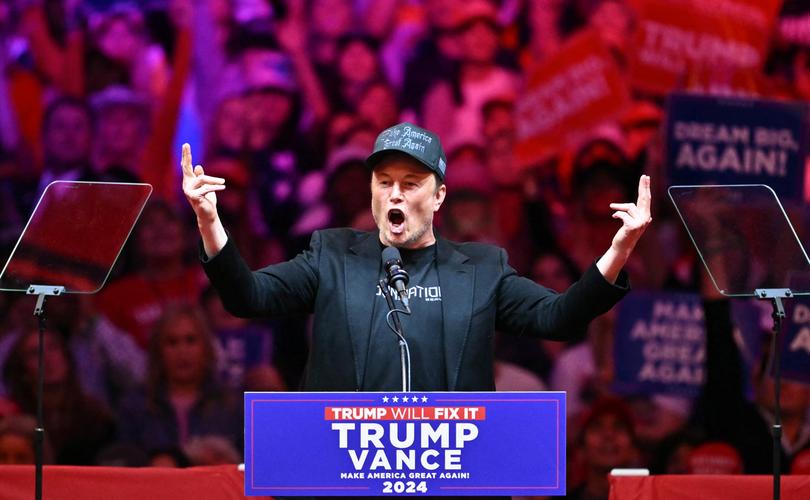THE ECONOMIST: Elon Musk’s Tesla is not the only winner under Donald Trump’s new regime
THE ECONOMIST: Elon Musk has added almost $US40b to his fortune thanks to the soaring price of Tesla shares, but his is not the only company faring well.

A part of Donald Trump’s political genius is being all things to all people — or at least to all of his supporters.
He has said so many contradictory things, throughout his public life and during the presidential campaign, that it is easy to latch on to the bits you like and either ignore those you don’t, or dismiss them as braggadocio.
Investors, it seems, are no different. The former president’s decisive victory sparked a global rally in equities, as stock pickers filled the Trump-shaped hole in their vision of the future with hopes and dreams. In those reveries, lower taxes and less red tape propel the planet’s biggest economy, and with it the economy of the planet as a whole.
Sign up to The Nightly's newsletters.
Get the first look at the digital newspaper, curated daily stories and breaking headlines delivered to your inbox.
By continuing you agree to our Terms and Privacy Policy.By the end of the week stocks were up by 2.4 per cent globally relative to election day.
Look at share prices and Mr Trump somehow seems great for Tesla’s electric vehicles and Detroit’s gas-guzzlers; for Wall Street and for crypto firms; for American manufacturers, whom he vows to protect, and for Mexican firms, from which they allegedly need protecting; for oil stocks, though his urging to “drill, baby, drill” could depress profits by denting crude prices. Even shares in Chinese firms, cannon fodder in any Trumpian trade war, gained 2 per cent by the end of November 7.
The world is complicated and not everything revolves around the American vote (really). Last Friday China unveiled a $US1.4trillion ($2.1trn) stimulus package to jolt the world’s second-biggest economy. A day earlier the Government imploded in the third-biggest, Germany. The fourth, Japan, has been in limbo since a general election on October 27, where no party won a majority.
Even in America, investors’ enthusiasm may owe more to the decisiveness of Mr Trump’s win, which eliminated worries about post-election unrest, than with the winner himself.
All of which makes predicting which businesses will and which will not thrive in the next four years a mug’s game — especially until it becomes clear who will be making policy under Mr Trump. Call Schumpeter a mug, then — or enough of one to venture three guesses. First, US firms will do better than non-American ones. Second, in America, smaller listed companies should enjoy a bigger boost than large ones. Third, Mr Trump and his cronies may not make out like bandits.
The main reason corporate America as a whole ought to best its peers is that it has been doing so for years, Trump or no Trump. American firms are bigger, grow faster and turn fatter profits than rivals in other countries. On top of that starting advantage they would, obviously, benefit from any cuts to corporate taxes, which flow automatically to their bottom line, and from deregulation, which cuts other costs.
Although legal and legislative hurdles might get in the way of Mr Trump’s campaign promise to slap a 10-20 per cent tariff on all foreign goods, and 60 per cent for Chinese ones, some increase in tariffs is likely. US firms would pay more for imports and face retaliation when selling abroad. Lucky for them, they are on average less exposed to global commerce than multinationals in the export-oriented economies of China, Europe and Japan.
If worse comes to worst, America Inc can always fall back on its vast domestic market. Tariffs won’t be “beautiful”, to use Mr Trump’s locution, for shoppers, but in the short run they needn’t be ugly for profits.
The S&P 500 index has jumped by 3.7 per cent since Mr Trump’s victory, while similar indices in other places have risen less (China, Japan, Mexico), fallen (Europe, Hong Kong) or flatlined (India). Impressive—until you see the 6.1 per cent leap by the Russell 2000, which tracks the smallest public companies in America. This is a welcome change for not-so-big business, whose returns have lagged behind those of corporate superstars for about ten years, the longest spell in decades, observes Steven DeSanctis of Jefferies, an investment bank.
Now things may look up for business’s Davids. They are less able than the Goliaths to slice through tedious bureaucracy, so less of it would benefit them more. Under Mr Trump, who fancies himself dealmaker-in-chief, trustbusters may wave through more acquisitions, which create value for the smaller target’s shareholders (though not necessarily for those of the buyer).
And in the event of a tariff tit-for-tat, smaller firms tend to be less exposed to international trade than multinationals. The two biggest post-election winners among America’s 1,500 most valuable firms were domestically focused tiddlers (and the stuff of Democrats’ nightmares): GEO Group, which among other things runs detention centres for migrants, and CoreCivic, a private-prison operator. Each gained two-thirds in value over three days, bringing their combined market capitalisation to $US6b.

Donald & Co: buy, hold or sell?
Exactly how much Mr Trump and his chums will end up profiting is uncertain. Elon Musk has added almost $US40b to his fortune thanks to the soaring price of Tesla shares, up by 28 per cent since November 5 — a tidy return on the $US100m or so he spent on helping elect Mr Trump. An early test of the bromance looms. The campaign made a promise to repeal emissions rules. But some of these let Tesla sell credits to carmakers that do not make enough EVs to meet regulatory standards.
According to Jefferies, credit sales accounted for 35 per cent of the free cashflow Tesla generated between 2019 and 2023 (before operating and capital expenses). What happens next will be a useful guide to Mr Musk’s influence over policy — and to the performance of his commercial empire.
Things looks hazier, alas, for the listed parent of Mr Trump’s X clone, Truth Social.
After wild swings its shares ended the week 6 per cent cheaper than the morning after the election. On polling day it reported a net loss of $US19m on sales of $US1m.
The American president’s immense power is no match for arithmetic.
